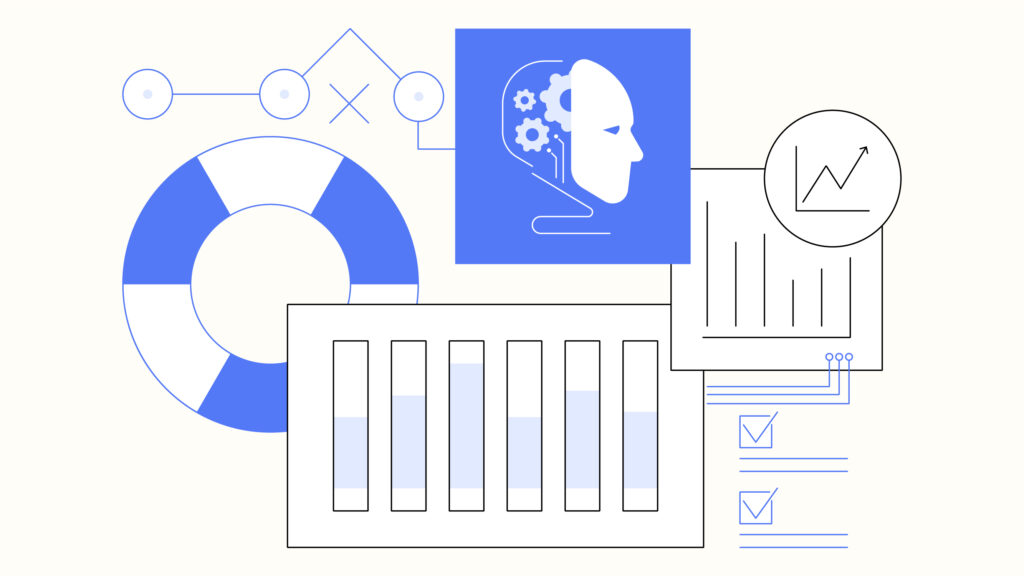Introduction
Artificial Intelligence Statistics: Artificial intelligence (AI) has rapidly become a disruptive force, revolutionizing industries and transforming the way businesses operate and interact with their customers. By analyzing massive amounts of data and performing tasks typically managed by humans, AI is driving advancements in sectors like healthcare, finance, automotive, and retail. Key technologies, including machine learning, natural language processing, and robotics, are driving this evolution, leading to more streamlined operations, improved decision-making, and enhanced personalisation.
As AI continues to advance, its capacity to address complex global issues, streamline processes, and open new business opportunities is becoming increasingly apparent, solidifying its role as a cornerstone of future technological development.
Editor’s Choice
- 77% of devices in use currently incorporate some form of AI technology.
- 90% of organizations view AI as a key driver for gaining a competitive edge.
- AI is expected to contribute USD 15.7 trillion to the global economy by 2030.
- By 2025, AI could displace 85 million jobs but also generate 97 million new roles, resulting in a net increase of 12 million jobs.
- 63% of organizations worldwide plan to adopt AI within the next 3 years.
- 88% of individuals who don’t use AI are unsure of its potential impact on their lives.
- While AI powers 77% of devices, only one-third of consumers recognize their use of AI platforms.
- The market for AI technologies is projected to reach approximately $ 244 billion by 2025, with expectations of significant expansion, surpassing $ 800 billion by 2030.
- Generative AI is the leading AI technology, with 51% of companies utilizing it for customer support, content creation, and process automation.
(Source: National University, Statista)
Global Artificial Intelligence Market Size
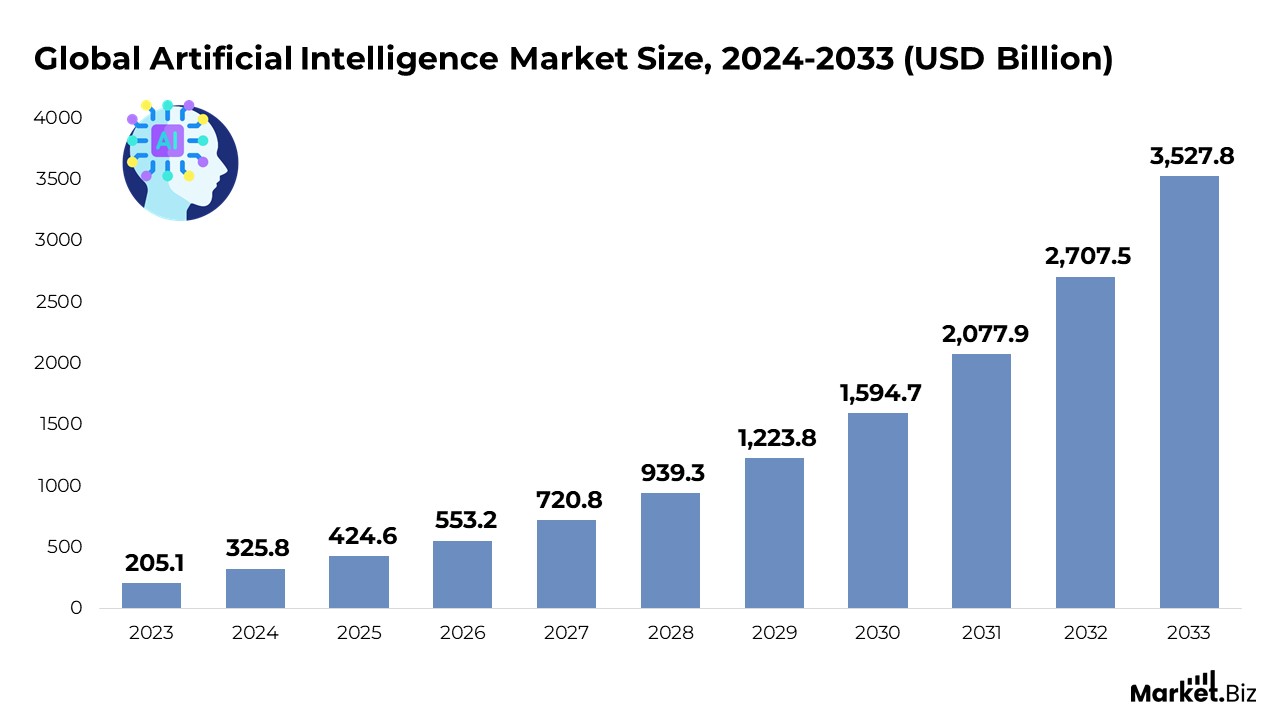
- According to Market.us, the global Artificial Intelligence market is estimated to grow from $424.6 billion in 2025 to $2,707.5 billion by 2032, representing a compound annual growth rate (CAGR) of 30.3% from 2024 to 2033.
- Increased adoption of AI across sectors like healthcare, automotive, finance, and retail, driven by the availability of large data sets for analysis.
- In 2023, the Software segment led the AI market, capturing over 43.7% of the share due to its foundational role in enabling AI functionality.
- The Cloud-based segment dominated in 2023, accounting for more than 64.6% of the AI market, thanks to its scalability, flexibility, and cost efficiency.
- In 2023, Machine Learning (ML) accounted for over 41.1% of the AI market share, largely due to its essential role in powering a wide range of AI applications.
- The healthcare sector captured over 15.9% of the AI market in 2023, driven by AI’s role in transforming diagnostics, management, and treatment protocols.
- North America led the global AI market in 2023, accounting for over 38.9% of the market share, supported by strong innovation ecosystems and public-private sector collaboration.
(Source: Market.us)
Global AI Sensor Market Size
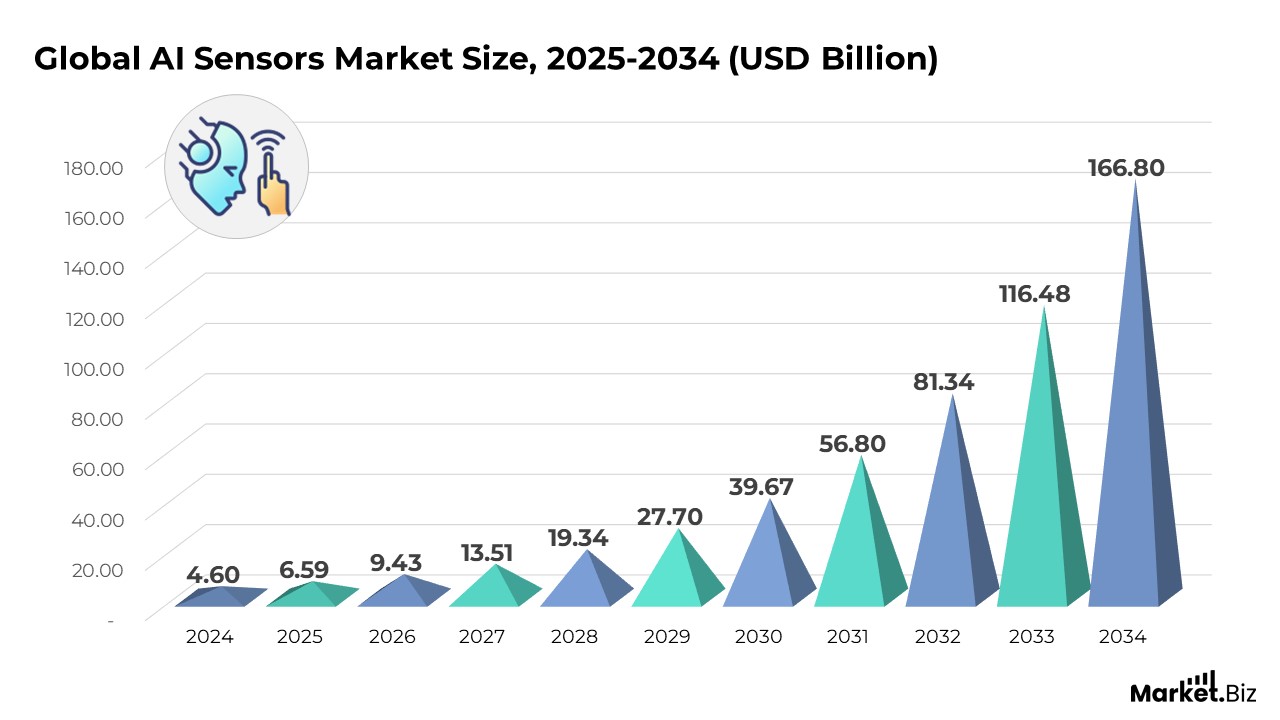
- According to Market.us, the global AI Sensor market is estimated to grow from $6.59 billion in 2025 to $81.34 billion by 2032, representing a compound annual growth rate (CAGR) of 43.20% from 2025 to 2034.
- Market growth is driven by the increasing use of AI to enhance sensor capabilities and the growing demand for automation and predictive maintenance in industrial sectors.
- In 2024, the Machine Learning (ML) segment dominated the AI sensor market, with an over 31% share, driven by its ability to enhance sensor performance and intelligence through data-driven learning.
- The Optical Sensors segment captured over 34% of the AI sensor market in 2024, led by the demand for high-precision measurements across various applications.
- In 2024, the Smart Home Automation segment held a leading position with over 37% of the market share, fueled by the growing adoption of connected devices for convenience, security, and energy efficiency.
- The United States led the AI sensor market in North America in 2024, with a market size of USD 2.25 billion and a strong compound annual growth rate (CAGR) of 38.3%, supported by advanced technological infrastructure and high AI adoption rates.
(Source: Market.us)
How is AI used in everyday life?
- In 2022, approximately 142 million people in the United States used voice assistants, with this number projected to increase to 157.1 million by 2026.
- In the U.S., AI-generated content from artists and musicians on social media was the most favored, with 25% of consumers finding it appealing.
- 35% of consumers found AI-powered shopping assistants attractive, as they assisted in discovering new products and services.
- Traffic prediction technology in Google Maps has enhanced real-time ETA accuracy by 34% in Orlando, 29% in Washington D.C., and 41% in Sydney.
- In the U.S., 76% of survey participants reported owning a smart TV, and at least 20% of households have other smart home devices.
- A Pew Research survey found that 55% of Americans report using AI regularly, while 44% believe they do not use AI frequently.
- According to AIPRM, the most common AI applications in the workplace include:
- 78.5% of people use email spam filters.
- 62.2% rely on chatbots for customer service inquiries.
- AIPRM also highlighted the following personal AI usage patterns:
- 61.4% of consumers use virtual assistants.
- 48.5% benefit from algorithmic recommendations in playlists.
- 50.6% use wearable fitness devices or trackers
(Source: Statista, KFF, elfsight, Pew Research, AIPRM, Corp.)
AI and User Trust
Artificial intelligence (AI) is generating increasing interest and discussion across multiple sectors, including education, business, and healthcare. As AI technologies evolve, public opinion regarding their potential benefits and risks continues to shift. Below are some key insights from recent studies on AI and consumer views:
- 90% of students express a strong desire to learn more about AI in schools, highlighting the growing importance of AI literacy in today’s education system.
- Over 54% of people can distinguish between human-generated and AI-generated content, indicating a rising awareness of AI’s capabilities.
- 67% of individuals would choose ChatGPT over Google for information searches, reflecting a shift in how users engage with AI-driven tools versus traditional search engines.
- 50% of consumers have a positive outlook on AI, showcasing increasing optimism about its potential advantages.
- 54% of consumers believe AI can improve customer experiences, emphasizing its ability to enhance personalization and service quality.
- 65% of consumers trust businesses that utilize AI, suggesting that AI adoption in companies is viewed as a sign of innovation and trustworthiness.
- 14% of consumers express distrust toward companies using AI, pointing to concerns regarding transparency and ethical considerations.
- 21% of consumers remain indifferent about businesses using AI, showing a notable portion of the population is undecided or uncertain.
- 78% of respondents believe the benefits of generative AI outweigh its risks, demonstrating strong support for its positive impact despite ongoing concerns.
- 39% of individuals feel confident that current AI technology is safe and secure, although many still have doubts about its dependability.
- While a majority are more apprehensive than excited about AI, 51% of men and 40% of women are more excited than worried about its development.
- 62% of millennials and 57% of Gen Z are more excited than concerned about AI, while only 30% of boomers share this sentiment, illustrating generational differences in attitudes toward AI.
- 80% of people are concerned about the potential use of AI in cyberattacks, and 78% are worried about its application in identity theft, highlighting significant security concerns.
- 74% of individuals fear AI may be misused to create deceptive political advertisements, showing anxiety about its potential manipulation in media and politics.
- 54% of consumers believe AI will improve written content, demonstrating confidence in AI’s ability to enhance communication and content generation.
- 4.1% of those surveyed think AI will offer no benefits, reflecting a small but notable group of questioners.
- 12.4% of respondents feel AI will not have any drawbacks, showing a minority that views AI’s future with total optimism.
- 39% of adults in a Pew Research study are comfortable with AI being used in healthcare, with 38% believing it could improve healthcare outcomes and 40% seeing it as a tool for reducing errors.
- 51% of participants think AI can help reduce racial and ethnic bias, demonstrating AI’s potential to address systemic inequalities in various fields.
(Source: Pew Research, National University)
AI Adoption Across Industries
- By 2023, 70% of customer service organizations are expected to use AI-driven virtual customer supporters.
- The global market for AI in autonomous vehicles is projected to reach USD 36 billion by 2025.
- By 2019, 54% of healthcare companies had integrated AI technology into their operations.
- AI spending in the manufacturing sector is forecasted to reach USD 15.7 billion by 2025.
- 84% of financial executives believe AI will be highly important for their business success within the next two years.
- By 2024, AI is expected to account for 32% of the travel industry’s revenue.
- Only 1% of eCommerce companies reported using AI to improve the customer experience.
(Source: World Economic Forum, Forbes, Oxford Economics, BBC, Hypotenuse AI.)
AI Marketing Statistics
- Nearly 90% of respondents intend to allocate a specific portion of their budget to AI marketing tools, with increased investment expected next year.
- In the past year, AI tools delivered a return on investment (ROI) that exceeded expectations for 80% of marketers.
- While over 40% of marketers are concerned that AI might replace certain roles, 97% believe that AI will have a positive impact on their careers, with only 3% anticipating negative effects.
- 5% of businesses are already leveraging AI for marketing, and an additional 31% plan to integrate AI within the next year.
- 53% of marketing leaders are either using or planning to use AI for predictive analytics and customer insights.
- 75% of midsize and large organizations plan to utilize AI-powered content generation tools to personalize their marketing efforts.
- Only 5% of marketers currently use AI for audience segmentation and targeting.
- 20% of marketing teams are dedicating over 40% of their budget to AI-driven campaigns.
(Source: Influence Marketing Hub, Adobe, Emarsys, Statista, Forrester, Invoca Inc.)
E-commerce and Retail Artificial Intelligence Statistics
- 62% of retail organizations have formed dedicated teams and allocated budgets to incorporate generative AI into their future product and service development strategies
- The use of generative AI among retail employees is expected to grow from 36% in 2023 to 45% in 2025, marking a 9% increase over the next two years
- 50% of retailers prioritize customer experience as the main focus of their generative AI strategy, with 35% targeting employee experience and 15% emphasizing operational efficiency
- 93% of retail organizations acknowledge that generative AI is a key topic of discussion in their boardrooms.
- The top three practical applications of generative AI in retail include generating personalized responses for agents to efficiently email or message customers (31%), developing a conversational digital shopping assistant to help customers find products or services (29%), and creating personalized promotions for loyalty members (27%).
(Source: Capgemini Research Institute, Retail and Salesforce AI Council, Digital Ocean)
Artificial Intelligence Customer Services Statistics
- 59% of consumers believe generative AI will transform their interactions with companies within the next two years.
- 43% of customers are enthusiastic about using generative AI.
- 75% of consumers who have already used generative AI expect it to impact their customer service experiences shortly significantly.
- 56% of Customer Experience (CX) leaders are actively exploring new generative AI vendors for their CX tools.
- 69% of organizations believe generative AI can enhance the human element of digital interactions.
- 72% of CX leaders anticipate AI agents will become an extension of their brand’s identity, reflecting its values and tone.
- 70% of CX leaders report that generative AI has prompted their organizations to re-assess their customer experience strategies.
- 64% of CX leaders plan to increase investments in AI and related technologies in the coming year.
- Approximately 62% of CX leaders and their teams are feeling pressure to adopt generative AI.
- 42% of CX leaders foresee generative AI impacting voice-based interactions within the next two years.
- 56% of customers believe that bots will be capable of having natural conversations by 2026.
- 58% of CX leaders expect their chatbots to become more advanced in 2024.
- 51% of consumers prefer interacting with bots over humans when seeking immediate service.
- 67% of consumers are expanding their range of inquiries, requesting AI/bots to answer more diverse questions than before.
(Source: Zendesk, Boston Consulting Group)
AI Security Statistics
- A Capgemini study revealed that organizations incorporating AI into their cybersecurity strategies saw a 12% improvement in threat detection and response.
- 69% of organizations utilize AI or machine learning for fraud detection and prevention.
- AI has the potential to automate up to 45% of cybersecurity tasks.
(Source: Invoca Inc., Capgemini, McKinsey)
AI Jobs Statistics
- By 2025, automation and AI are projected to eliminate 85 million jobs globally while simultaneously creating 97 million new roles across various sectors.
- AI specialist roles are expected to grow by 40%, resulting in the creation of 1 million new jobs for AI and machine learning professionals.
- While fewer than 5% of jobs are fully automatable, approximately 60% of jobs have at least 30% of tasks that can be automated.
- According to an IBM survey, 81% of CEOs trust AI skills are critical for their organization’s future, and 78% plan to focus on workforce development in AI and automation.
- Over 90% of marketing professionals agree that experience with AI will be essential in 2025 and beyond.
- 58% of HR leaders have already invested in or plan to invest in AI for talent acquisition and candidate screening.
Source: Invoca Inc., Future of Jobs Report, World Economic Forum, IBM, McKinsey)
The Impact of ChatGPT on Business Operations
A survey by Forbes revealed that nearly two-thirds (65%) of CEOs plan to integrate ChatGPT into their business strategies, choosing it over traditional search engines. A substantial 97% believe that incorporating ChatGPT will have a positive influence on their business operations.
- 74% of business owners anticipate AI will help generate customer responses (e.g., chatbots).
- 70% expect AI to expedite content generation.
- 58% see AI creating a more personalized experience for their customers.
- 57% believe AI will drive increased web traffic.
- 53% foresee AI streamlining job processes.
- 53% anticipate AI will assist in summarizing information.
- 50% believe AI will improve decision-making capabilities.
- 47% expect AI to enhance business credibility.
- 47% foresee AI aiding in translation tasks.
- 46% expect AI to generate responses to colleagues (e.g., emails).
- 44% believe AI will create content in multiple languages.
- 41% anticipate AI will fix coding errors.
- 30% expect AI to generate website copy.
(Source: Forbes)
The Impact of AI on Employment Trends
- By 2030, 36 million American workers in jobs requiring exposure to automation may see the majority of their tasks performed by robots.
- AI is expected to create 97 million new jobs globally by 2025.
- Up to 20 million manufacturing jobs worldwide could be replaced by robots by 2030.
- 30% of current U.S. jobs are at risk of automation, with 60% likely to be significantly changed by AI tools.
- By 2030, half of the global workforce will require retraining due to advancements in AI.
- AI is projected to eliminate 85 million jobs globally by 2025
AI Adoption by Enterprise Size in Europe
- In 2024, 13.48% of enterprises in the European Union (EU) adopted AI technologies.
- In 2024, 41.17% of large enterprises in the EU implemented AI technologies.
- In 2024, the information and communication sector saw the highest usage of AI among enterprises.
- In 2024, the percentage of enterprises using at least one AI technology across EU countries ranged from 3.07% to 27.58%.
- Denmark had the highest share at 27.58%, followed by Sweden at 25.09% and Belgium at 24.71%.
- Poland (5.9%), Romania (3.07%), and Bulgaria (6.47%) recorded the lowest shares of AI adoption.
- Compared to 2023, all EU Member States saw an increase in the proportion of enterprises using AI technologies in 2024.
- Sweden experienced the highest growth with a 14.72 percentage point increase, while Portugal recorded the smallest increase.
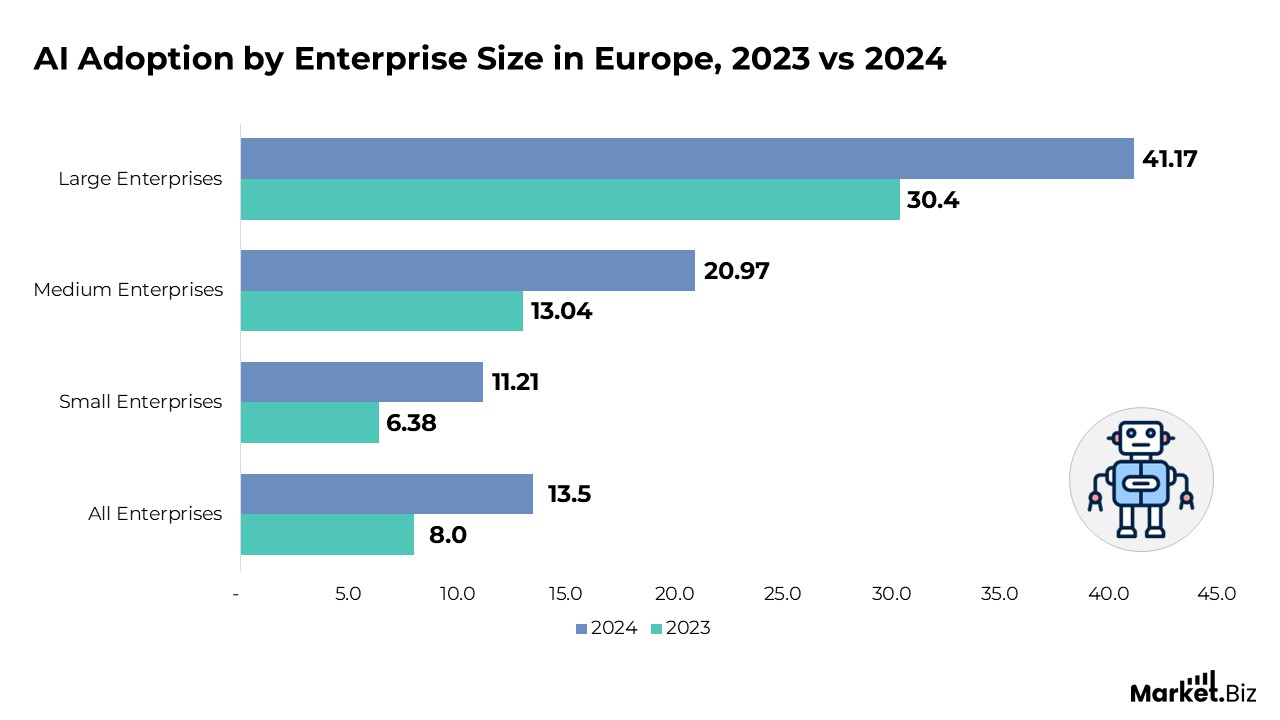
AI Technology Adoption in Europe by Enterprise Activity
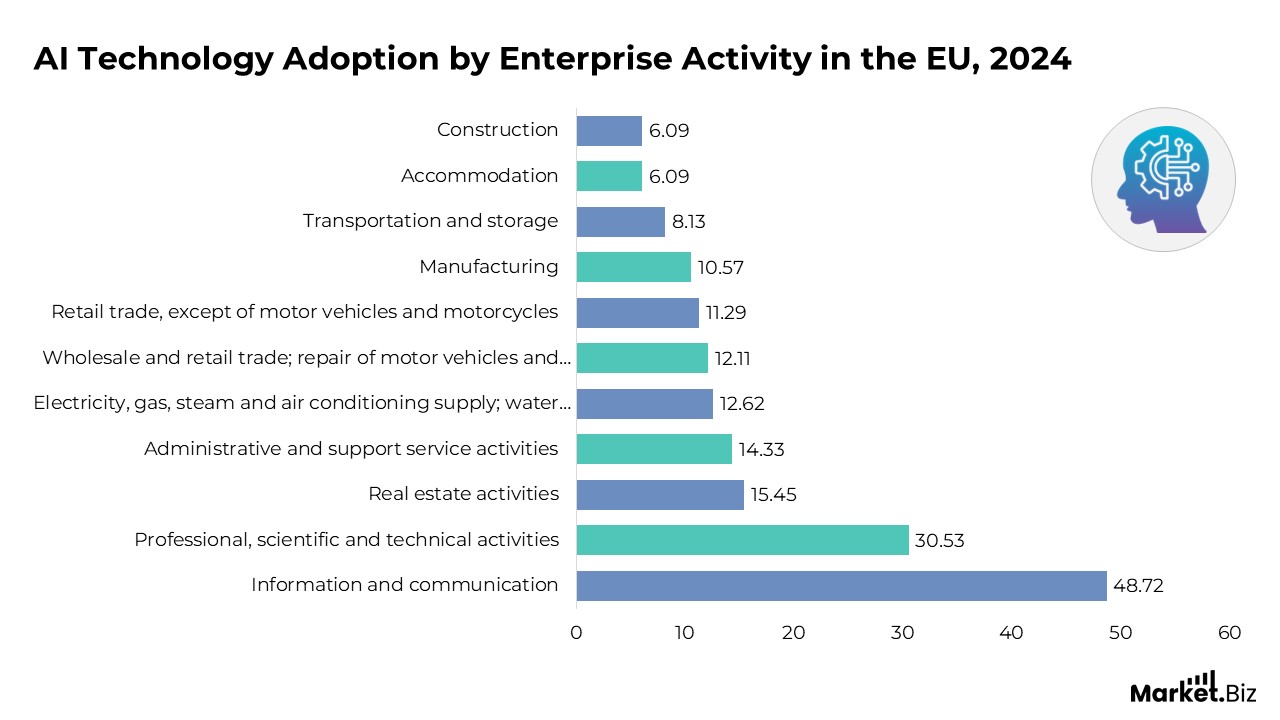
(Source: Europen Union)
Statistics on AI Natural Language Processing (NLP)
- In 2022, the global number of digital voice assistants is expected to reach 8.4 billion.
- In the U.S., Amazon’s Alexa led the market with 74.2 million active users, followed by Apple’s Siri with 48.4 million users and Google Assistant with 41.4 million users.
(Source: Statista, Voicebot’s Voice Assistant Consumer Adoption Report, Invoca Inc.)
Support for AI Regulation and Assurance
- Only 5% of respondents support a national initiative to ensure the security and safety of AI.
- 81% of respondents believe industries should invest more in AI assurance.
- 85% of respondents want industries to be transparent about their AI assurance practices before launching AI-enhanced products.
- Support for AI assurance is strong across Democrats, Republicans, and Independents.
- Younger generations are more open to using AI technology for everyday tasks compared to older generations.
- There is widespread support for AI regulation across all age groups.
- 64% of respondents believe the primary role of AI is to assist, enhance, and empower consumers, a 7-point decrease from November 2022.
- (Source: National University)
Consumer Perception of Artificial Intelligence
- 43% of respondents feel that artificial intelligence and machine learning tools are overhyped.
- 54% of respondents reported that their company acknowledges and encourages the use of AI in the workplace. In comparison, 34% have refrained from implementing AI and machine learning tools in their organizations due to security concerns.
- 63% of respondents voiced concerns about AI inaccuracy, while 52% were worried about the potential for intellectual property violations.
- 72% of respondents indicated that their organization’s trust in AI has grown since the emergence of Generative AI in late 2022.
- 39.4% of respondents cited issues with model output accuracy as a major challenge when developing AI applications. Additionally, 79% of Americans express distrust in businesses, stating that they do not trust them at all to use AI responsibly.
- 60% of respondents believe their organization is successfully balancing the rapid integration of Generative AI with processes to minimize potential risks.
(Source: DigitalOcean, Retool, Gallup, McKinsey Deloitte)
Artificial Intelligence Funding Statistics
- AI startups are achieving significantly higher valuations compared to non-AI startups, with the gap expanding as they mature. At the B-series funding stage, AI startups have a valuation 60% higher than their non-AI counterparts.
- Venture funding for AI startups saw an increase in Q1 2024, with AI-focused startups raising $12.2 billion across 1,166 deals, marking a 4% rise from the $11.7 billion raised in 1,072 deals in Q4 2023.
- The AI technology market was valued at approximately $200 billion in 2023, and it is expected to grow substantially, surpassing $1.8 trillion by 2030.
- In 2022, global AI investments surged, with the United States leading the way in newly funded AI companies. That year, 1,392 AI companies worldwide received funding of over $1.5 million each, with the U.S. accounting for 542, followed by the European Union (293) and the UK (160).
- AI funding saw a massive increase in 2023, with investments in generative AI alone reaching $25.2 billion, nearly an eightfold increase from the previous year.
(Source: Statista, Stanford AI Index Report, Crunchbase, Our World in Data and AI Index Report)
Conclusion
Artificial intelligence is having a profound impact on a wide range of industries, transforming business processes, consumer interactions, and everyday life. By enhancing customer experiences, automating tasks, and improving decision-making, AI technologies are becoming indispensable in modern businesses. While AI adoption is accelerating, with numerous organizations investing in AI solutions, there are ongoing concerns about transparency, security, and the potential for job displacement.
As AI continues to evolve, its capacity to revolutionize industries and create new opportunities is clear. However, businesses and policymakers must address the challenges associated with its integration. The future of AI is full of potential, and its widespread application will undoubtedly reshape how we work, communicate, and live.
FAQ’s
Artificial intelligence (AI) is making a significant impact in various industries, including healthcare, finance, retail, automotive, manufacturing, and customer service. It enhances operations, improves customer interactions, and drives innovation across these sectors.
Businesses are leveraging AI for tasks such as automating customer service with chatbots, enhancing decision-making through predictive analytics, personalizing marketing efforts, optimizing supply chains, and streamlining product development and innovation.
Concerns about AI often center around data privacy, transparency, security risks, job displacement, and the potential for AI to make biased decisions. Ethical concerns, especially regarding job automation and surveillance, are also frequently raised by consumers.
AI enhances customer experience by offering personalized interactions, providing predictive customer support, enabling faster response times, and ensuring 24/7 availability. AI-driven tools, such as chatbots and virtual assistants, help businesses offer more efficient and responsive services.
While AI is expected to replace certain jobs, especially in repetitive or manual tasks, it also creates new opportunities in fields such as AI development, data analysis, and machine learning. Experts predict a net increase in jobs as AI reshapes existing roles rather than replacing them entirely.
AI is revolutionizing marketing by automating content creation, personalizing consumer interactions, improving customer insights through data analysis, and enhancing ad targeting. Generative AI, in particular, enables businesses to create dynamic and engaging content quickly and efficiently.
